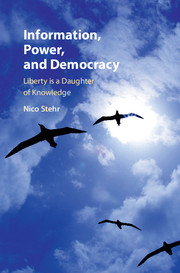Book contents
- Frontmatter
- Contents
- List of figures
- List of tables
- Introduction
- 1 Coming to terms
- Excursus: How much knowledge does democracy need, and how expensive should it be?
- Excursus: An inconvenient democracy: knowledge and climate change
- 5 The knowledge of the powerful
- 6 The knowledge of the weak
- Knowledge and democracy: summary and conclusions
- Bibliography
- Index
5 - The knowledge of the powerful
from Excursus: An inconvenient democracy: knowledge and climate change
Published online by Cambridge University Press: 05 December 2015
- Frontmatter
- Contents
- List of figures
- List of tables
- Introduction
- 1 Coming to terms
- Excursus: How much knowledge does democracy need, and how expensive should it be?
- Excursus: An inconvenient democracy: knowledge and climate change
- 5 The knowledge of the powerful
- 6 The knowledge of the weak
- Knowledge and democracy: summary and conclusions
- Bibliography
- Index
Summary
Grave doubts and reservations about the viability of democratic governance – that is, the ability to reach political decisions with the assistance of institutional arrangements that assure the participation of the largest number of citizens including a reasonably general distribution of information – have been raised by social scientists from multiple vantage points. In Chapter 4, I spelled out some of the hopes for and concerns about democracy linked to the societal role of the institution of the scientific community. The philosophers of the Vienna Circle and John Dewey occupy the more optimistic part of the spectrum of views about the contribution of science to democratic governance; Walter Lippmann and some scientists from the contemporary climate science community, for example, represent the more pessimistic tendency and, as they likely see it, the realistic observers with respect to the political ideal of democracy as a means of governance for modern societies facing highly difficult and unsolved, if not unsolvable, complex problems. I will now turn to the role that scientific knowledge may have once it is disseminated to society and to the particular patterns of dissemination that tend to be established in society. The preeminent view of the pattern of the social distribution of knowledge generated by the scientific community in modern societies tends to stress its asymmetric structure and, therefore, the highly stratified access to the use of such knowledge for political purposes, a view that, of course, amounts to the assertion that knowledge primarily flows to the powerful.
Thus, the question of a significant concentration of knowledge in modern societies will be at the center of my inquiry, in the following chapter, into the varied themes of the societal role of scientific knowledge. More specifically, my focus will be on the advancement of knowledge and its burdens, as some of the orthodox answers to queries about the societal circulation of knowledge would suggest. The answer to the question of the political consequences of the typical social distribution of (specialized) knowledge in modern societies rests almost exclusively on the premise that specialized knowledge, in terms of power-enhancing knowledge, is not only distributed in a highly unbalanced manner but is also controlled and effectively deployed by the elites of society.
- Type
- Chapter
- Information
- Information, Power, and DemocracyLiberty is a Daughter of Knowledge, pp. 204 - 242Publisher: Cambridge University PressPrint publication year: 2015



